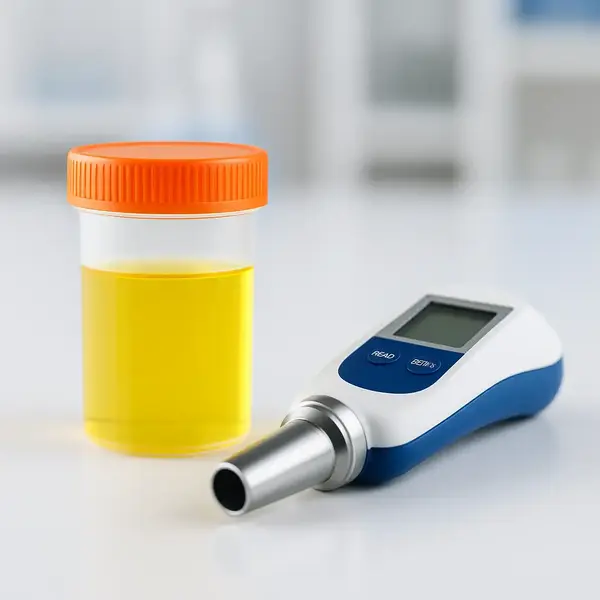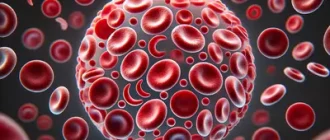Urine Specific Gravity Test measures how concentrated your urine is, showing how well your kidneys balance water and dissolved substances. It works a bit like checking the density of a liquid to see whether it’s more like light rainwater or thicker broth. This simple idea sets the stage for understanding why the test matters in everyday clinical practice.
The urine specific gravity, which is evaluated during routine checkups and hydration assessments, is one of the most commonly used quick indicators of kidney function and fluid balance. USG values often shift with dehydration, illness, or certain metabolic conditions, making these measurements a practical tool across all age groups.
In many situations, such as after a long day or during an illness when someone notices unusual fatigue or darker urine, checking USG can highlight early changes before bigger problems appear. Understanding these urine SG results meaning helps a person see the pattern behind their symptoms and prepares them for the detailed explanations that follow.
Why Doctors Order This Test
Physicians request USG testing when they need a quick read on fluid status, kidney concentrating function, or solute load. The test is common in emergency departments, outpatient nephrology clinics, urology practices, and primary care. USG is especially useful in differentiating between prerenal causes of dehydration, renal tubular dysfunction, and disorders involving hormones like vasopressin.
Doctors often use USG during evaluation of sudden weakness, dizziness, high serum sodium levels, unexplained fatigue, or suspected kidney injury. It’s also standard during pregnancy checkups and in patients with chronic kidney disease. Recent U.S. public health data suggest that chronic kidney disease affects about 35.5 million U.S. adults, and many of them are unaware of their condition. ⧉
Reyus Mammadli, medical consultant, notes that clinicians rely on USG because it “quickly points them toward dehydration or renal impairment,” helping avoid unnecessary delays in care.
How the Test Works (Methods + Innovations)
USG can be measured in several ways, each offering distinct advantages. The three main methods include reagent dipsticks, optical refractometers, and automated digital analyzers.
Dipstick testing is the quickest method and widely used in clinics. It changes color based on ionic concentration. Accuracy: 5/10. Average cost: $5–$10 per test. Despite its limitations, it remains a staple because it’s “fast and good enough” for initial screening.
Optical refractometry measures how light bends through urine, producing far more precise readings. Accuracy: 8.5/10. Cost: $15–$25. Many emergency departments rely heavily on refractometers, as their results correlate strongly with urine osmolality. ⧉
Automated analyzers such as the Siemens Clinitek Advantus and IDEXX VetLab UA Analyzer (used in both human and veterinary medicine) rely on digital sensors to provide consistent, high‑throughput results. These machines integrate directly into electronic laboratory systems and reduce human error. ⧉
The latest innovation includes smart refractometry, integrating optical sensors with AI‑driven calibration to minimize drift and enhance accuracy. Labs in several U.S. medical centers have already adopted these systems.
Normal vs. Abnormal Results
| USG Value | Possible Meaning | Typical Clinical Context |
|---|---|---|
| 1.005–1.010 | Well-hydrated | Routine screening |
| 1.010–1.020 | Normal range | General population |
| 1.020–1.030 | Concentrated | Mild dehydration |
| >1.030 | High concentration | Significant dehydration or solute overload |
Understanding what specific gravity numbers actually mean helps clinicians assess hydration, kidney function, and solute concentration patterns.
Normal range: 1.005–1.030. People at the lower end tend to be well‑hydrated, while higher values usually reflect solute concentration.
Low USG (<1.005): Can indicate over‑hydration, impaired renal concentrating ability, or conditions such as diabetes insipidus. It can also follow aggressive IV fluid administration.
High USG (>1.030): Often associated with dehydration, vomiting, diarrhea, or conditions that increase solute load (e.g., glycosuria). Some medications—particularly osmotic agents—can temporarily elevate the reading.
Studies in clinical and sports-medicine settings show that urine specific gravity values near or above 1.030 are often used as a marker of clinically relevant dehydration. ⧉
Conditions Linked to High or Low Specific Gravity
Several disorders reliably influence USG values. Chronic dehydration, electrolyte imbalance, acute kidney injury, chronic kidney disease, adrenal disorders, and renal tubular acidosis rank among the most common.
Low USG is frequently linked to central or nephrogenic diabetes insipidus, where vasopressin signaling is impaired. High USG is common in syndromes that increase solute concentration, such as uncontrolled diabetes, where glucose spills into the urine.
Clinical research, including work published in JAMA, has shown that persistent abnormalities in urine specific gravity often accompany structural kidney disease and impaired renal concentrating ability. ⧉
Modern Diagnostic Technologies
| Diagnostic Method | Accuracy | Cost (U.S.) | Best Use |
|---|---|---|---|
| Dipstick | 5/10 | $5–$10 | Quick screenings |
| Refractometer | 8.5/10 | $15–$25 | Precise readings |
| Digital Analyzer | 9/10 | $20–$40 | Hospital labs |
This section breaks down each diagnostic method in detail, including procedure, accuracy, and U.S. pricing.
Reagent Dipstick
- How it’s done: A disposable strip is dipped into a fresh urine sample; chemical pads react to ionic concentration. The reaction shifts color, similar to how pH paper changes shades.
- How to prepare: No special preparation; midstream clean-catch sample preferred.
- Why doctors choose it: Fast, practical, ideal for quick decisions in primary care and urgent care settings.
- Understanding the result: The color shift reflects ion activity, so results can be influenced by urine pH or very dilute samples.
Optical Refractometer
- How it’s done: A drop of urine is placed on a prism; the device measures how light bends as it passes through the sample. More concentrated urine bends light “harder,” similar to how thicker glass refracts more intensely.
- How to prepare: No special preparation; avoid overly diluted urine for most accurate readings.
- Why doctors choose it: Highly consistent results and favored in nephrology practices.
- Understanding the result: Light refraction directly reflects solute density.
Automated Digital Analyzers
- How it’s done: Urine is loaded into a cartridge or test strip port; internal sensors measure density using digital refractometry and conductivity detection. The process is fully automated, similar to placing a banknote into a bill validator that checks authenticity through multiple sensors at once.
- How to prepare: Standard clean-catch urine sample. No diet, fluid, or medication restrictions unless a clinician specifies otherwise.
- Why doctors choose it: These systems shine in high‑volume hospital labs, where consistency matters more than manual speed. They integrate with laboratory information systems (LIS) and reduce variability caused by human interpretation.
- Understanding the result: Digital analyzers combine refractive index scanning with calibration algorithms, minimizing drift and ensuring uniform readings from sample to sample. This makes the results especially trustworthy when clinicians are monitoring subtle changes in renal concentrating ability.
Treatment Options Based on Findings
Treatment depends entirely on what the USG reveals. Here are the primary categories.
Dehydration‑Related Elevation
- Approach: Oral rehydration solutions, electrolyte monitoring, and IV crystalloids in medical settings.
- Expected effectiveness: High when underlying cause is corrected.
- Cost: $50–$200 in outpatient settings.
Low USG Due to Dilution or Hormonal Disorder
- Approach: Evaluation for diabetes insipidus; medications such as desmopressin (DDAVP) when appropriate.
- Effectiveness: High for central diabetes insipidus.
- Cost: $80–$150 per month.
Renal Impairment
- Approach: Monitoring renal markers, adjusting medications, and managing comorbidities.
- Effectiveness: Varies depending on disease stage.
- Cost: Variable.
Solute‑Driven Elevation (e.g., glucose)
- Approach: Adjustment of antidiabetic medications and monitoring.
- Effectiveness: Improves rapidly with glycemic control.
- Cost: Depends on medication regimen.
Real U.S. Clinical Cases
Case 1: 42-year-old male from Phoenix, Arizona
He later described that week as “the desert winning the fight.” The patient worked long outdoor shifts during a heatwave, brushing off fatigue and dizziness as simple overwork. After two days of worsening headache, nausea, and almost no urine output, he decided something wasn’t right. At the clinic, a basic urinalysis showed a USG of 1.039, pointing clearly toward significant dehydration. Additional labs ruled out electrolyte collapse and kidney injury.
He received IV normal saline, about 1.5 liters over several hours. Symptoms eased quickly—his headache vanished first, then the dizziness. No medications were required, though clinicians did monitor renal markers for the next 24 hours. The patient was discharged with instructions on heat safety and hydration strategy, which he followed closely for the rest of the season.
Case 2: 63-year-old woman from Chicago, Illinois
She told her doctor she felt like she was “living in the bathroom.” For weeks, she experienced intense thirst and frequent urination, waking up multiple times nightly. At first she assumed age-related hormonal shifts, but things escalated when she began feeling persistently tired despite sleeping enough.
In-clinic testing revealed a USG of 1.004, unusually low even for someone well-hydrated. Because diabetes mellitus was suspected first, the care team ran glucose panels, which came back normal. The next step involved a water deprivation test and urine osmolality measurement. Results steered clinicians toward central diabetes insipidus.
She was started on desmopressin (DDAVP), which significantly reduced nighttime urination within days. Her energy improved, and follow-up USG values stabilized slightly higher as water balance normalized. The patient described the treatment as “getting my life back on a predictable schedule.”
Case 3: 28-year-old female from Atlanta, Georgia
Her story began with unexplained fatigue, unintentional weight loss, and a faint sweet smell in her urine that she couldn’t ignore. After noticing blurred vision episodes, she scheduled an urgent appointment. Her urinalysis returned a USG of 1.031, and glucose was detected in urine.
Further lab work confirmed newly diagnosed type 1 diabetes. She was admitted for stabilization, started on an insulin regimen (basal-bolus therapy), and received dietary counseling. Over the next week, her glucose levels were brought under control, and USG normalized as osmotic diuresis settled.
She later told clinicians she wished she had sought help earlier, but was grateful the team quickly identified the problem through simple tests like USG.
Editorial Advice
Reyus Mammadli, medical consultant, highlights that USG is “small in price, big in diagnostic value” and recommends that clinicians always interpret it alongside urine osmolality for deeper insight. The editorial team emphasizes that USG should not be viewed as a standalone diagnostic answer but as a high‑value clue within a broader clinical puzzle. They advise patients to stay attentive to hydration habits, monitor symptoms like persistent fatigue or sudden changes in urine output, and undergo kidney‑related testing when clinicians suggest it.
About the Author
Reyus Mammadli is the author of this health blog since 2008. With a background in medical and biotechnical devices, he has over 15 years of experience working with medical literature and expert guidelines from WHO, CDC, Mayo Clinic, and others. His goal is to present clear, accurate health information for everyday readers — not as a substitute for medical advice.







